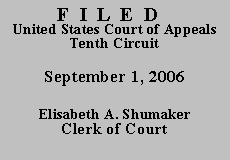

| ANDREW J. O'CONNOR,
Plaintiff-Appellant, v. THE FLORIDA BAR, Defendant-Appellee. |
|
Mr. O'Connor was admitted as a member of the Florida Bar in 1990. In April 1992, he was severely injured in a car accident. About this time, the Bar placed him on emergency suspension, apparently for reasons unrelated to his injuries. According to Mr. O'Connor, the Florida Supreme Court ordered the Bar to file a complaint against him regarding the emergency suspension allegations within sixty days of being notified of his recovery from the accident, but the Bar never filed a complaint. He states that, in December 1993, the Florida Supreme Court granted his motion to be listed as inactive due to incapacity.
In 2002, Mr. O'Connor sought a limited license to practice law in New Mexico. He informed the New Mexico Supreme Court that he was an inactive member in good standing of the Florida Bar. When contacted, however, the Bar stated that Mr. O'Connor was under emergency suspension. In September 2003, the Bar initiated a disciplinary complaint against Mr. O'Connor, alleging that his New Mexico application contained a false statement of material fact about his Florida Bar status.
Mr. O'Connor sued the Florida Bar under § 1983 and state law, alleging it deprived him of property without due process by failing to allow him to contest the 1992 emergency suspension and it abused the disciplinary process, harassed, defamed, and inflicted emotional distress on him by initiating and prosecuting the 2003 disciplinary proceeding. He sought monetary damages and injunctive relief. Upon Mr. O'Connor's request, the clerk of the district court entered a default against the Bar. Upon the Bar's motion, the district court set aside the entry of default and dismissed the case for lack of subject matter jurisdiction because the Florida Bar enjoys Eleventh Amendment immunity against a § 1983 suit.
On appeal, Mr. O'Connor argues that the district court should not have vacated the entry of default. This issue is reviewed for abuse of discretion. See Stjernholm v. Peterson, 83 F.3d 347, 349 n.1 (10th Cir. 1996). Fed. R. Civ. P. 55(c) allows a court to set aside an entry of default for good cause shown. "A judgment is void when a court enters it lacking subject matter jurisdiction," and "[r]elief from a void judgment is mandatory." Williams v. Life Sav. & Loan, 802 F.2d 1200, 1202-03 (10th Cir. 1986) (per curiam). It follows that lack of subject matter jurisdiction constitutes good cause to set aside an entry of default. As discussed below, the district court lacked jurisdiction over the case, and accordingly, it did not abuse its discretion in setting aside the entry of default.
As for the dismissal of the case, our review is de novo. Joseph A. ex rel. Corrine Wolfe v. Ingram, 275 F.3d 1253, 1259 (10th Cir. 2002). The Eleventh Amendment bars suits, whether for monetary damages or injunctive relief, against a state or an arm of the state. See Pennhurst State Sch. & Hosp. v. Halderman, 465 U.S. 89, 100 (1984); Elam Constr., Inc. v. Reg'l Transp. Dist., 129 F.3d 1343, 1345 (10th Cir. 1997) (per curiam). Eleventh Amendment immunity pertains to the court's subject matter jurisdiction. See Ruiz v. McDonnell, 299 F.3d 1173, 1180 (10th Cir. 2002).
Mr. O'Connor argues that the Florida Bar is a private entity and so is not entitled to Eleventh Amendment immunity. However, the Eleventh Circuit, which encompasses Florida, has held to the contrary. See Kaimowitz v. Fla. Bar, 996 F.2d 1151, 1155 (11th Cir. 1993) (per curiam) ("Plaintiff's only response to the Defendants' argument is his unsupported assertion that the Florida Bar is not a state agency for Eleventh Amendment purposes. Plaintiff's assertion is contradicted by the preamble of the Rules Regulating the Florida Bar, whereby the Supreme Court of Florida established the bar as 'an official arm of the Court.'"). Further, the Florida Supreme Court, who ought to know, has also characterized the Florida Bar as "'an official arm of the Court.'" Fla. Bar v. Committe, 916 So.2d 741, 745 (Fla. 2005) (quoting R. Regulating Fla. Bar, Introduction), cert. denied, 126 S. Ct. 1890 (2006). In light of these authorities we can comfortably conclude that the Florida Bar is an arm of the Supreme Court of Florida, and thus it is entitled to Eleventh Amendment immunity.
There are two exceptions to Eleventh Amendment immunity, abrogation by Congress and waiver. See Joseph A., 275 F.3d at 1259. Neither apply here; § 1983 does not abrogate Eleventh Amendment immunity, see Quern v. Jordan, 440 U.S. 332, 341 (1979), and the Bar did not consent to Mr. O'Connor's action or otherwise waive its immunity. Therefore, the district court correctly dismissed the case. See Williams, 802 F.2d at 1202 ("A court has an obligation to dismiss a complaint for lack of subject matter jurisdiction.").
The judgment of the district court is AFFIRMED.
Entered for the Court
Circuit Judge
*. After examining the briefs and appellate record, this panel has determined unanimously that oral argument would not materially assist the determination of this appeal. See Fed. R. App. P. 34(a)(2); 10th Cir. R. 34.1(G). The case is therefore ordered submitted without oral argument. This order and judgment is not binding precedent, except under the doctrines of law of the case, res judicata, and collateral estoppel. The court generally disfavors the citation of orders and judgments; nevertheless, an order and judgment may be cited under the terms and conditions of 10th Cir. R. 36.3.